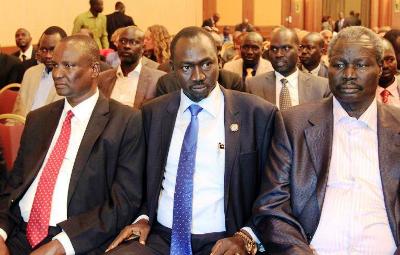S. Sudan’s warring parties begin direct talks to end conflict
January 7, 2014 (ADDIS ABABA/JUBA) – Peace negotiators representing South Sudan government and officials who rebelled against it last month began face-to-face peace talks in the Ethiopian capital, Addis Ababa on Tuesday.

Although the direct talks were welcomed by regional leaders, sources close to the peace talks told Sudan Tribune on Tuesday that it is “unlikely” the two rival factions would strike a ceasefire deal in the coming days.
Delegations representing President Salva Kiir and rebels loyal to his former deputy Riek Machar both agreed on Monday to start direct talks to end three weeks of conflict in the world’s newest nation. Taban Deng Gai, a former governor of Unity state governor currently leads the rebel delegation while South Sudan’s former foreign minister Nhial Deng Nhial leads the government team.
Seyoum Mesfin, the former Ethiopian foreign minister, now the IGAD lead mediator, said the direct talks would mainly focus on two issues; cessation of hostilities and the release of the nine remaining political prisoners held in the aftermath of the mid-December outbreak of violence on Juba, the South Sudan capital.
President Kiir implicated Machar over the violence, which the latter denies. An estimated over 1,000 people, according to the United Nations, have been killed and nearly 200,000 displaced in South Sudan’s worst-ever post-independence conflict.
As close-door talks began on Tuesday, South Sudan said it would not accept any rebel preconditions detrimental to negotiations seeking an end to weeks of violence.
South Sudan’s information minister said his government was ready for “smooth peace”, adding they would decline any “preconditions inserted” during ongoing talks.
“It was very clear that we are in for talks without preconditions. Our president has been very clear from the 16 December, from day one, that we are ready for talks without conditions”, said Michael Makuei Lueth.
“We are not ready to negotiate on preconditions”, he added, despite international pressure for South Sudan to release detained politicians aligned with Machar.
“We have law that respect land, constitution and coup-related issues; this is an attempted coup – if we released those politicians, it is a capital offence to South Sudan law”, stressed Leuth, also South Sudan government spokesperson.
The detained politicians would be required to answer the allegations as required under South Sudanese law, he added.
READY FOR TALKS
Meanwhile, the spokesman for the South Sudanese rebel forces, Hassien Maar Nyuot, told reporters in Addis Ababa that they were ready to talk peace with government on a range of political issues.
Nyuot, a former deputy governor of Jonglei state, joined the anti-government rebellion on 16 December, along with former minister of education Stephen Par, his law enforcement counterpart, Gabriel Dup and several other junior officers.
“We are going to discuss a long list of issues: political issues to do with issues within the SPLM, the root causes of the conflict and issues of governance, and these will definitely follow”, he said.
NO AGREEMENT
South Sudan’s chief negotiator, Nhial Deng Nhial, said the government is committed to a cessation of hostilities, but no agreement had yet been reached.
Last month’s clashes, which initially started in Juba, later spread to other regions across South Sudan, pitting members of Kiir’s ethnic Dinka community against Machar’s Nuer tribe. Both sides appear to believe that control of the country’s key towns would give them a stronger position during the Addis Ababa negotiations.
Analysts, however, anticipate it could take a few days for both parties to reach a deal.
(ST)
